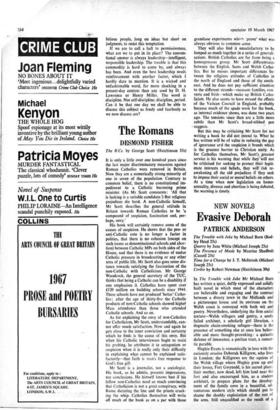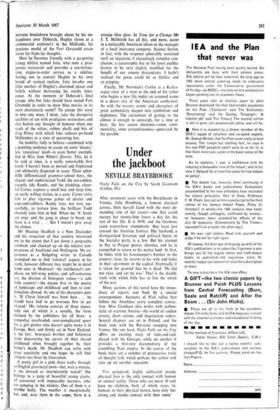NEW NOVELS
Evasive Deborah
PATRICK ANDERSON
The Trouble with lake by Michael Burn (Rod- ley Head 25s) Quarry by Jane White (Michael Joseph 25s) The Presence of Music by Maurice Shadbolt (Cassell 25s) Time for a Change by J. T. McIntosh (Michael Joseph 25s) Corbie by Robert Newman (Hutchinson 30s) In The Trouble with Jake Mr Michael Burn has written a quiet, deftly expressed and solidly built novel in which most of the characters are believable and engaging and the contrast between a dreary town in the Midlands and a picturesque house and its environs on the Welsh coast is conveyed with both wit and poetry. Nevertheless, underlying the firm social texture—Welsh villagers and gentry, a seedy failed architect, a scholarly girl librarian, a dogmatic chain-smoking refugee—there is the presence of something else at once less believ- able and more thought-provoking: a quixotic defence of innocence, a puritan tract, a roman- tic parable.
Hughie Evans is romantically in love with the curiously evasive Deborah Killigrew, who lives in London; the Killigrews are the squires of the Welsh village where Hughie grew up and their house, Fort Gwynedd, is his sacred place; their mother, now dead, left him land near the fort and also encouraged him, as a student architect, to prepare plans for the develop- ment of the family cove in a beautiful, ad- venturous modern style which should put to shame the shoddy exploitation of the rest of the area. Still unqualified as the result of a
nervous breakdown brought about by his un- happiness over Deborah, Hughie slaves at a commercial architect's in the Midlands, his precious model of the Fort Gwynedd estate never far from his thoughts.
Here he becomes friendly with a go-getting young nihilist named Jake, who runs a pros- perous restaurant and provides a sex-instruc- tion, orgies-to-order service as a sideline. Setting out to convert Hughie to his own brand of cynical realism, Jake invades one after another of Hughie's cherished places and beliefs without destroying his sturdy inno- cence. At the moment of Deborah's final escape, who but Jake should have rented Fort Gwynedd in order to show blue movies in its most charismatic room? To accept this story in toto one must, I think, take the disruptive qualities of sex with prodigious seriousness and also banish any thought of humour when one reads of the whips, rubber phalli and bits of drag flimsy with which Jake reduces po-faced Midlanders to a state of quivering lust.
An inability fully to believe—combined with a puzzling tendency to assent on some 'deeper,' less 'conscious' level—is even better exempli- fied in Miss Jane White's Quarry. This, let it be said at once, is a really remarkable first novel. I haven't been so moved and frightened and ultimately disgusted in years. Three splen- didly differentiated grammar-school boys, the elegant and sophisticated Todd, the sex-sodden, creepily tidy Randy, and the plodding, cheer- ful Carter, capture a small boy and keep him, an eerily willing victim, in a cave. Carter visits him to play vigorous games of pirates and cops-and-robbers; Randy tries, not very suc- cessfully, to torture him; the brilliant Todd chastely joins him in bed. When the 'A' levels are over, and the gang is about to break up, there is a trial. . . . But I mustn't give away the climax.
Mr Maurice Shadbolt is a New Zealander and his evocation of that country interested me to the extent that I got down a geography textbook and checked up on the relative tem- peratures of Auckland and Wellington. My ex- perience as a fledgeling writer in Canada prompted me to find 'colonial' aspects in his work, however different they might be in detail from ours in Montreal: the intellectual's em-
phasis on left-wing politics and self-conscious art, the distrust of bourgeois values—`a safe
little country'—the escape first to the poetry of landscape and childhood and then to con- firmation abroad. As one of his characters puts it, 'If Christ himself was born here . . . he would have had to go overseas first to get okayed.' His volume consists of three pieces, only one of which is a novella, the form claimed by the publishers for all three: a somewhat overloaded, over-complicated quest for a girl pianist who doesn't quite make it in Europe. Best, and firmly set in New Zealand, is the last: bourgeois brother and bohemian sister discovering the secrets of their shared Childhood when brought together by their father's death. Mr Shadbolt can write with great sensitivity and one hopes he will find subjects less beset by frustration.
A pretty girl in a pink dress walks through an English provincial town—but, wait a minute, is she dressed or intermittently naked? She belongs to a gang of beautiful young giants, all accoutred with impeccable neatness, who are camping in the vicinity. One of them is a terrible bully. The weather is exceptionally hot, and, over there in the copse, there is a
strange blue glow. In Time for a Change Mr J. T. McIntosh has all this, and more, occur in a noticeably American idiom to the manager of a local insurance company. Science fiction, in fact, with the suspense admirably sustained until an ingenious if exceedingly complex con- clusion; a catastrophic fire in the town enables history to be very slightly modified for the benefit of our remote descendants. I hadn't realised the genre could be so lifelike and so gripping.
Finally, Mr Newman's Corbie is a Kafka- esque story of a man at the end of his tether who begins a new life under an assumed name in a desert city of the American south-west. As with the master, events and characters of great authenticity deepen into symbolism and nightmare. The excitement of getting to the climax is enough to outweigh, for a time at least, the less secure elements—some senti- mentality, some pretentiousness—generated by the parable.































 Previous page
Previous page